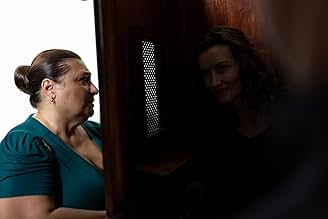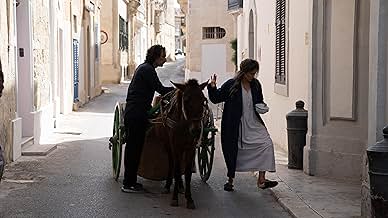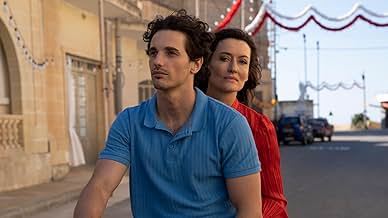In un piccolo villaggio del Mediterraneo, Carmen si è presa cura di suo fratello, il prete locale. La Chiesa ha scambiato Carmen per il nuovo sacerdote, e lei comincia a vedere il mondo, e s... Leggi tuttoIn un piccolo villaggio del Mediterraneo, Carmen si è presa cura di suo fratello, il prete locale. La Chiesa ha scambiato Carmen per il nuovo sacerdote, e lei comincia a vedere il mondo, e se stessa, in una nuova luce.In un piccolo villaggio del Mediterraneo, Carmen si è presa cura di suo fratello, il prete locale. La Chiesa ha scambiato Carmen per il nuovo sacerdote, e lei comincia a vedere il mondo, e se stessa, in una nuova luce.
- Regia
- Sceneggiatura
- Star
- Premi
- 3 vittorie totali
Chakid Zidi
- Ahmad
- (as Chakib Zidi)
Recensioni in evidenza
In a year of really terrific films, Carmen stands out as one of the most endearing, fresh, and unique stories that has made its way to the screen in 2023.
Set in 1980s Malta, on the historically infused island of Gozo, this tale of a woman doomed for life by the tradition of having to serve to her brother's needs while in his position as a Roman Catholic priest may seem, at first, somber. But when she is released from her servitude by her brother's unexpected death, her life spirit is awakened while discovering the world to which she was denied access for her entire adult life.
The film is filled with whimsy, humor that made me laugh out loud repeatedly, and clever and inspired synchronistic plot elements. It's quirky, it's delightful, it's sweet, and it's a brilliant gem that deserves an audience.
Besides the refreshing story, star Natasha McElhone shines, as she always does, but the way in which she transforms in this film is extraordinary. She plays the lead character with such empathy and conveys a spirit of child-like discovery - as if she was entering the world for the first time. At the same time, she is so believable that when we see her character also being very resourceful and clever, it feels authentic. And besides McElhone, there isn't a flawed performance in the film.
To add to the outstanding performances, the setting of Gozo in the Maltese archipelago is breathtaking. As viewers, we not only discover the traditions of Malta, but also the magnificence of its sweeping and enigmatic landscapes and enchanting towns. Everything comes together giving the audience a magical and uplifting experience. Yet it also reveals archaic and dark practices of the Catholic church from an observational perspective rather than from a judgmental one.
This is a film that I haven't hesitated in the least recommending to everyone I know. It's rare to find such ebullience in such an intelligent script about a woman who finds her voice and place in a world still all too fraught with damaging patriarchal structures. Bravo to writer/director Valerie Buhagiar for sharing a story inspired by her own aunt's challenging circumstances in such a creative and heartfelt way.
Set in 1980s Malta, on the historically infused island of Gozo, this tale of a woman doomed for life by the tradition of having to serve to her brother's needs while in his position as a Roman Catholic priest may seem, at first, somber. But when she is released from her servitude by her brother's unexpected death, her life spirit is awakened while discovering the world to which she was denied access for her entire adult life.
The film is filled with whimsy, humor that made me laugh out loud repeatedly, and clever and inspired synchronistic plot elements. It's quirky, it's delightful, it's sweet, and it's a brilliant gem that deserves an audience.
Besides the refreshing story, star Natasha McElhone shines, as she always does, but the way in which she transforms in this film is extraordinary. She plays the lead character with such empathy and conveys a spirit of child-like discovery - as if she was entering the world for the first time. At the same time, she is so believable that when we see her character also being very resourceful and clever, it feels authentic. And besides McElhone, there isn't a flawed performance in the film.
To add to the outstanding performances, the setting of Gozo in the Maltese archipelago is breathtaking. As viewers, we not only discover the traditions of Malta, but also the magnificence of its sweeping and enigmatic landscapes and enchanting towns. Everything comes together giving the audience a magical and uplifting experience. Yet it also reveals archaic and dark practices of the Catholic church from an observational perspective rather than from a judgmental one.
This is a film that I haven't hesitated in the least recommending to everyone I know. It's rare to find such ebullience in such an intelligent script about a woman who finds her voice and place in a world still all too fraught with damaging patriarchal structures. Bravo to writer/director Valerie Buhagiar for sharing a story inspired by her own aunt's challenging circumstances in such a creative and heartfelt way.
When the priest of a small Maltese parish dies, his longtime caretaker and housekeeper (his younger, now-spinsterly sister) finds herself without living or working arrangements. What is she to do to support herself? Such is the lot of Carmen, the title character of this slightly whimsical but vastly underdeveloped, allegedly fact-based tale of a woman seeking to discover and reinvent herself at middle age. Writer-director Valerie Buhagiar's latest tries to keep its story light and bouncy, but it often does so without much direction, purpose or follow-through with regard to the various disconnected incidents that arise. It's almost as if the picture is trying to get by on a bucket full of charm and the frequent employment of synchronicities, many of which are supposed to seem meaningful but often go without explanation. The result is a largely pointless exercise in trying to tell a tale that should be full of warmth, fun, lightheartedness and redemption. It's also a missed opportunity to showcase the talent of Natascha McElhone in what should have been one of her best performances in years. But, as it plays now, "Carmen" is, regrettably, more like an inside joke that most of us are being left out of.
A feel-good little film detailing how little sprinklings of humaneness and liberalism can overcome systemic failures in society and the church.
The film is the journey of the titular character traversing from being stifled for many decades to discovering how to be happy once again.
The ending is seemingly deliberately unrealistically over-optimistic, and that's the point. It is a film designed to lift one's spirits and see the good in the world again.
While certainly not for everyone - for example, it won't be for those who like only realistic dramas and those who strongly adhere to the stringent side of Catholicism - personally, I feel in love with it.
It doesn't overstay its welcome and has a few laugh-out-loud moments too, especially in the opening third. Recommended.
The film is the journey of the titular character traversing from being stifled for many decades to discovering how to be happy once again.
The ending is seemingly deliberately unrealistically over-optimistic, and that's the point. It is a film designed to lift one's spirits and see the good in the world again.
While certainly not for everyone - for example, it won't be for those who like only realistic dramas and those who strongly adhere to the stringent side of Catholicism - personally, I feel in love with it.
It doesn't overstay its welcome and has a few laugh-out-loud moments too, especially in the opening third. Recommended.
It's a comedy-drama set in the 1980s in the Republic of Malta. It follows the life of a late-40s woman after the sudden death of her older brother. She had served as a housekeeper for her Catholic priest brother for 30 years. It's loosely based on the life experience of the director's aunt.
Carmen (Natascha McElhone)'s family forced her to look after her brother, Father Francis (Henry Zammit Cordina), from age 16. He is austere and disliked by his small-town parish. After his death, another priest plans to come. The new priest's sister, Rita (Michaela Farrugia), will look after him.
Carmen has nowhere to go, but God keeps supplying signs to guide her. Some of the options she chooses are engaging and very funny. At one point, Carmen has a relationship with a young pawnbroker, Paulo (Steven Love), which includes more drama. Throughout, we have flashbacks to a relationship she had as a young girl with an Arab boy, Ahmad (Chakid Zidi).
There is a resolution of sorts by the end, though some story threads are incomplete.
This engaging movie is about blossoming in middle age after three decades of repressed living. Natascha McElhone is excellent, as is Steven Love as Paulo. Many of the fringe players are also very good. The cinematography makes full use of Malta's beauty. Highly recommended.
The director grew up in Toronto but had a Maltese heritage. The film is a joint Canadian-Malta project.
Carmen (Natascha McElhone)'s family forced her to look after her brother, Father Francis (Henry Zammit Cordina), from age 16. He is austere and disliked by his small-town parish. After his death, another priest plans to come. The new priest's sister, Rita (Michaela Farrugia), will look after him.
Carmen has nowhere to go, but God keeps supplying signs to guide her. Some of the options she chooses are engaging and very funny. At one point, Carmen has a relationship with a young pawnbroker, Paulo (Steven Love), which includes more drama. Throughout, we have flashbacks to a relationship she had as a young girl with an Arab boy, Ahmad (Chakid Zidi).
There is a resolution of sorts by the end, though some story threads are incomplete.
This engaging movie is about blossoming in middle age after three decades of repressed living. Natascha McElhone is excellent, as is Steven Love as Paulo. Many of the fringe players are also very good. The cinematography makes full use of Malta's beauty. Highly recommended.
The director grew up in Toronto but had a Maltese heritage. The film is a joint Canadian-Malta project.
Since the late WWII period, when she was 16, Carmen has been the unpaid housekeeper for her brother, the local priest. When he dies suddenly in the 1980s, a local woman's brother is supposed to be the replacement priest, and that woman will act as his housekeeper, displacing Carmen. The Catholic Church hypocritically and heartlessly throws Carmen out on the street, where she has various adventures and misadventures, helped in part by her knowledge of church processes.
Her backstory is that her life was saved by a young Arab, with whom she fell in love, and with family opposition, her role as housekeeper was the equivalent of "get thee to a nunnery".
Carmen's transformation from dour housekeeper to glamorous woman was a delight, as was the scenery. While this was "based on a true story", I wonder how much is fiction. Carmen seems to be good at giving advice to others, while she seems so naive herself. Meanwhile, the ending is a tad too Shakespearean for me.
Her backstory is that her life was saved by a young Arab, with whom she fell in love, and with family opposition, her role as housekeeper was the equivalent of "get thee to a nunnery".
Carmen's transformation from dour housekeeper to glamorous woman was a delight, as was the scenery. While this was "based on a true story", I wonder how much is fiction. Carmen seems to be good at giving advice to others, while she seems so naive herself. Meanwhile, the ending is a tad too Shakespearean for me.
Lo sapevi?
- QuizValerie Buhagiar: as Tonio's Mother.
I più visti
Accedi per valutare e creare un elenco di titoli salvati per ottenere consigli personalizzati
- How long is Carmen?Powered by Alexa
Dettagli
Botteghino
- Lordo Stati Uniti e Canada
- 3927 USD
- Lordo in tutto il mondo
- 3927 USD
- Tempo di esecuzione
- 1h 27min(87 min)
- Colore
- Proporzioni
- 2.35 : 1
Contribuisci a questa pagina
Suggerisci una modifica o aggiungi i contenuti mancanti




























